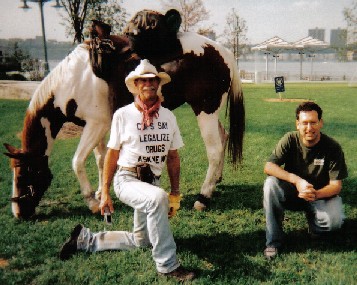Editorial:
Tell
Me
Why
11/18/05
David Borden, Executive Director, [email protected]
It was a significant event for intra-movement dynamics. One of the complaints about conferences from some reformers in recent years has been that we don't talk about legalization anymore. Not so now. The debate over how best to approach the issue, how far to go and what language to use, will doubtless continue. Many reformers will not go as far as LEAP or DRCNet does, or do so in the same way, no doubt, and some of them probably shouldn't for the particular work in the issue that they are doing. Not all reformers are persuaded about fully ending prohibition, for that matter. But with dozens of former police officers putting it right out there -- a former big city police chief among them, Seattle's Norm Stamper -- the explicitly anti-prohibition crowd is feeling accepted and empowered. Two past LEAP shirts have been phased out. One of them read "Cops Say End Drug Prohibition: Ask Me Why." It was dropped after an initial run because no one ever asked, quite unlike what happens with the "legalize" version. Another, more famous past LEAP t-shirt was the kind worn by Howard Wooldridge during a past cross-country ride with his horse Misty, "Cops Say Legalize Pot: Ask Me Why." But on his latest ride, though Howard still designed his own t-shirts, they bore the broader anti-prohibitionist message. I like my LEAP shirt. It makes me feel tough; it has a badge on it. I realize that a drawing of a badge on a t-shirt that I'm wearing doesn't actually make me tough. Then again, the drug war "chicken hawks" in Congress who call for "tough" laws but don't have to actually go out to enforce them aren't necessarily "tough" either. But that doesn't stop them from indulging in the fantasy, so maybe I can indulge a little too. Earlier this year, walking in my now former neighborhood, two women in a van pulled up at an intersection behind me and to my right. The driver stopped, rolled down her window, and called out to me a single word: "Why?" After 12 years, I confess to still having difficulty crafting a sufficiently succinct answer. The problem is that the issue is a complicated one that doesn't lend itself well to sound bites. Indeed, there are so many reasons to oppose prohibition and the drug war that it's hard to remember them all, let alone decide which ones to talk about first with which people. There are the extremities of the current drug war: mandatory minimum sentences, racial disparities, denial of access to medicines like marijuana or opiates for pain treatment, ever greater intrusions into privacy, ever more diverse attempts to control drug use through almost every area of government activity, half a million drug war prisoners and the world's highest incarceration rate. There are the consequences of prohibition itself: violence, spread of diseases by needle sharing, preventable overdoses or poisonings from adulterants or purity fluctuations, violence and instability in source and transit countries, addicts driven to desperate measures by the high prices of street drugs, popularization of more dangerous forms of drugs and drug-taking. There is the corruption of our institutions and the corrosion of the ethics and principles underlying our system of justice itself: compensated confidential informants (people who in effect receive "bribes" to help police arrest and imprison people), incessant violations and dilutions of constitutional rights, "testi-lying," inappropriate prosecutions. There are the skewed priorities, the diversion that drug enforcement represents from literally every other way we could use our money and personnel to make us safer, happier and better off. And of course, there is the loss of personal freedom, the right to choose what we put in our bodies, what we do with our minds, how we live our lives.
I got some interesting suggestions at the conference, but I remain unsatisfied. So I'm asking for your help. Please send me your thoughts and suggestions in this area -- you can reach me by e-mail at [email protected] -- tell me why, to help me tell others why. I will write about your responses here next week -- let me know whether or not I should identify you by name, and thanks in advance. To be continued...
| |||||||||||||||||||||||||||||||||||||||||||||||||||||||||||||||||||||||||||||||||


